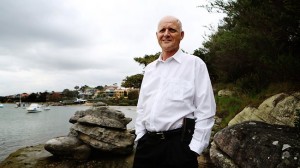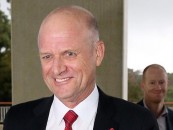A great article profiling David Leyonhjelm along with Bob Day from Family First
November 12, 2014
RECENTLY retired US politician Ron Paul lost the Republican nomination for president, but his tireless and consistent advocacy of classical, small-government liberalism indelibly transformed US politics, splintering the Republican Party and awakening a generation of younger, typically left-leaning voters to the idea that social and economic liberalism go hand in hand.
Australia’s Labor and Liberal parties should brace themselves for two home-grown Ron Pauls: Bob Day, chairman of the Family First Party, and David Leyonhjelm, treasurer of the hitherto obscure Liberal Democratic Party, who are set to enter the Senate next July for South Australia and NSW respectively, with profound ramifications for policy and politics alike.
Far from supporting Tony Abbott’s signature paid parental leave and direct action on climate change policies, Day and Leyonhjelm – two successful businessmen in their early 60s – will seek to reverse the inexorable growth of government spending and regulation and convince their tyro colleagues to do the same.
“I might vote for direct action or PPL if Abbott promised to cut income or company tax to a flat rate of 20 per cent,” says Leyonhjelm, who advocates substantial cuts to income tax and a severely curtailed welfare state.
“We are not hard-hearted but people in the first instance should look to themselves, their family and civil society before laying claim to other people’s taxes.”
Day, who also supports cuts to welfare and a flat 20 per cent tax, says: “All mothers should be treated equally; whether they have a job is irrelevant.”
Voters who associate Family First with cuddly if eccentric former senator for Victoria Steve Fielding are in for a shock.
“If I can achieve a fraction of what Bert Kelly did I’ll die a happy man,” says Day, founder of the Bert Kelly Research Centre, named in honour of the Liberal parliamentarian who died in 1997.
Kelly was an eloquent defender of freedom and a thorn in the side of big-spending Labor and Liberal governments of the 1960s and 70s but never held the balance of power.
“Most Liberals today are hopeless, even if they are generally better than the Labor alternative,” Day says, before putting in a good word for Trade Minister Andrew Robb and new parliamentary secretary Scott Ryan, who, he says, “still sometimes get proper liberalism”. He adds: “Howard was a big spender and was lucky to have people like Minchin and Costello reining him in.”
Australian voters smashed Labor-Greens control of the Senate on September 7, handing the balance of power – something Paul never enjoyed in the US – to eight senators, six of whom appear highly sympathetic to business and liberalism.
The Coalition will have 33 senators in the 76-seat upper house from July next year. Without the votes of the sole Democratic Labour Party senator and independent Nick Xenophon, the government will need the votes of all remaining six crossbenchers to implement its agenda: Day, Leyonhjelm, the three Palmer United Party senators and the Motoring Enthusiast Party senator Ricky Muir.
Greg Lindsay, founding director of the free-market Centre for Independent Studies, says election of the six seemingly free-market senators is an “important development” that major parties should note: “Their apparent ideological dispositions are quite different from what we have seen over the past generation or so since the Australian Democrats came to prominence.”
Leyonhjelm, since 1989 founding director of agribusiness consultancy Baron Strategic Services, suspects PUP senators and Muir are intrinsically pro-business, and hopes to set up a “minor party caucus” to vote in a block.
John Lloyd, managing director of Horticulture Australia, says Leyonhjelm will bring great intellect and a “rapier mind” to the Senate. “He will examine legislation totally dispassionately and rationally, and likely annoy politicians who vote based on emotion,” says Lloyd, a colleague of 30 years.
Ray Evans, chairman of the HR Nicholls Society, which champions free labour markets, says Day is a polished speaker who understands the influence of opinion on government.
“Bob will eloquently propound the old conservative values of self-reliance, cutting back on government control and freedom,” says Evans. “He will have no truck with the wets of the Liberal Party.”
“We support genuinely liberal policies based on ‘Austrian economics’ in contrast to the Keynesian claptrap routinely espoused,” Day explains.
“Bob’s passion for freer labour markets stems from his long years in the building industry, where independent contractors are so important for the industry’s efficiency,” says Evans.
Excessive minimum wages and byzantine employment regulation also rankles with Day.
“Someone has to stick up for the unemployed,” he says, bemoaning youth unemployment of about 40 per cent in Adelaide because of damaging mandated pay rises for apprentices.
A former president of the National Housing Association, Day says house price growth has been an “absolute disaster” and blames a combination of first-homeowners grants, negative gearing and especially state government control of land supply.
“We have a ridiculous situation where land is worth $10,000 a hectare on one side of a zoning boundary and $1 million a hectare on the other, simply because it’s zoned for residential housing,” he says. “The federal government should use the corporations power to allow companies to build residential housing on their land to circumvent state governments’ stranglehold on land supply.”
Leyonhjelm, who hopes to have a former Treasury official on his staff, is exercised about the yawning imbalance between state governments’ tax revenues and their responsibilities, suggesting it has been a disaster for political accountability and efficiency. He would scrap tied grants and encourage states to have their own income taxes, arguing each level of government should be financially independent.
“Except for where the Constitution gives the federal government clear rights, the states should be sovereign to do as they please, similar to the US,” he says.
As a strong federalist he argues the Howard government was wrong to strong-arm the states into a uniform national crackdown on guns, but concedes he is likely to make little difference.
“As a sporting shooter of many years I still feel very passionate about rights to gun ownership and despise how innocent people were criminalised,” he says.
Leyonhjelm wants a bare-bones welfare state but in its place would expand compulsory superannuation – abolishing tax on all contributions, earnings and withdrawals – but expanding the range of expenditures on medical, income and disability insurance.
Spooked by their loss of control of the upper house, both major parties since the election have suggested reform of the complex Senate voting system that is increasingly giving small parties a voice. But unless they team up, such reforms have little prospect of success.
“I can’t see any of the minor parties voting themselves into non-existence,” Leyonhjelm says, hinting he would try to make life very difficult for the Abbott government if it teamed up with Labor to make it impossible for them to retain their seats.
“For all the talk of so-called unrepresentative minor parties, as a group we are still under-represented in the parliament,” he says, noting the major parties’ dwindling share of first preference votes.
Day slams the Labor-Liberal “Coles-Woolies” political duopoly, joking he would like to be the IGA of Australian politics.
“They’ve doubled the per-candidate nomination fees from $500 to $1000 in the lower house and $1000 to $2000 in the Senate,” he says.
He is scathing of what he sees as politicians’ increasing lack of business and real-life experience, along with the major parties’ inclination to put former staff members into safe seats.
“Collectively they have little clue whatsoever; if you filled the House of Representatives with 150 people randomly off the street – as the courts do with juries – they’d do a much better job,” he says.
A former member of the South Australian Liberal Party, Day remains bitter about his treatment by the Liberals in the 2008 Mayo by-election, now held by the youthful Assistant Agriculture Minister Jamie Briggs.
“I’d lived in the electorate for ages and put my hand up but (former member) Alexander Downer pulled the ultimate swiftie on me, making it impossible for me to succeed and ensuring a staffer out of nowhere won the seat,” he says.
While agreement is likely to be the norm, on social and cultural issues the two men will differ. Family First is against same-sex marriage and controlled legalisation of marijuana, for instance, while the LDP supports both.
“I don’t believe in government chasing people for victimless crimes,” says Leyonhjelm, who questions the libertarianism of the Sex Party, which also advocates decriminalising recreational drugs.
Lindsay says: “It’s hard to predict how things will develop from next July, but the smaller government movement, particularly in the Liberals, could be strengthened by a bunch of senators whose inclinations are more overtly that way inclined.”
The Liberal Party is furious in particular about the election of Leyonhjelm, who it believes profited from his position on the ballot paper and the word liberal in his party’s title. So far the courts have dismissed the Liberals’ attempt to force the fledgling party to change its name but Leyonhjelm fears the Abbott government will use legislation to force it to.
“They think they own the word liberal but we are the real liberals; Labor at least (is) resigned to the Democratic Labour Party,” Leyonhjelm says.







